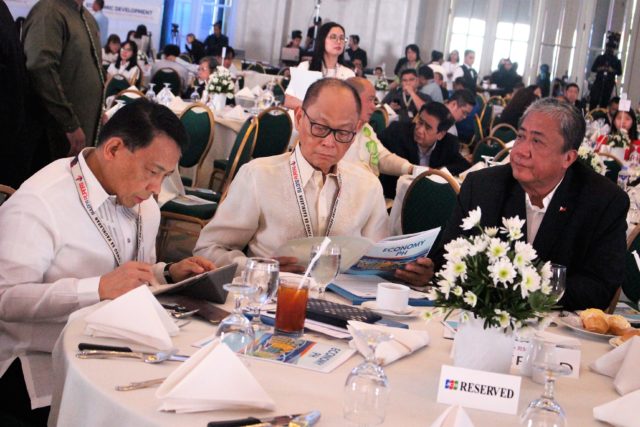(Budget and Management Secretary Benjamin Diokno (middle) cites the government’s efforts to curb underspending, especially in terms of government infrastructure to sustain and support economic growth and development during the Sulong Pilipinas 2018 Philippine Development Forum held at the ASEAN Convention Center in Clark Freeport Zone, Pampanga.(Cherie Joyce V. Flores/PIA 3))
CLARK FREEPORT — Department of Budget and Management (DBM) reported that in terms of budget utilization, the Philippines has finally put an end to underspending.
“In 2014, underspending was as high as 13.3 percent and 12.8 percent in 2015. So in those two years alone, some Php631 billion worth of projects were left unspent. However, when we started to assume office in mid-2016, we were able to lower it to 3.6 percent and 2.7 percent by the end of 2017,” DBM Secretary Benjamin Diokno told Central Luzon stakeholders during the Sulong Pilipinas 2018 Philippine Development Forum in Clark.
He added that based on preliminary data for the first nine months of 2018, this may be the first time actual government expenditures at Php2.49 trillion exceeded program expenditures at Php2.43 trillion.
“For the first nine months of this year, total government spending amounted to Php2.5 trillion. This is Php475 billion higher than total spending for the same period last year or an increase of 23.6%,” Diokno disclosed.
He furthered that comparison of infrastructure and other capital spending is even more impressive.
“Spending for the first nine months of the year increased by a staggering Php170 billion or 46%. This is clear proof that the Build Build Build program is firing on all cylinders,” Diokno said.
Last year, actual disbursements for infrastructure and other capital outlays outpays the program by Php19.4 billion or by 3.5%. Actual infrastructure disbursements are again ahead of the program by Php38.2 billion or 7.2 % this year.
The improvement in the budget utilization, he said, may be attributed to the government’s budget reform program.
“We inherited an obligation based budget system with appropriations valid for up to two years. Such a system posed perverse incentives. First, there was no pressure on bureaucrats to spend their budget within the given year. Second, since projects take a long time to take off and payments to contractors and service providers were delayed, the good, honest to goodness contractors and service providers shy away from government because of the long delays,” he said.
Due to these flaws, DBM implemented an annual cash based budget where goods and services must be inspected, delivered and paid for in the same fiscal year subject to an extended payment period of three months.
In closing, Diokno reiterated the government’s commitment to institutionalize reforms that will ensure proper budget utilization. – PIA 3





